A new state law is scheduled to go into effect on July 1 to ban hidden surcharges and other “junk fees” added to customers' bills, and companies will have to include those charges in the prices they publish or advertise.
Now, however, the author of that law proposes creating an exception for one type of business: restaurants.
Under the proposal from Sen. Bill Dodd (D-Napa), restaurants could continue to add surcharges, mandatory tips or fees to diners' bills instead of displaying “all-inclusive” prices on their menu, as long as they disclose the charges up front. . , “clearly and conspicuously.”
In a statement Thursday, Dodd said Senate Bill 1524 aims to clarify the new law.
“This proposal will level the playing field for all restaurants and address confusion and disagreement about what is allowed under state law,” Dodd said in a statement.
The confusion stems from conflicting statements from the state attorney general's office, which initially said restaurants could continue to charge surcharges as long as they were indicated on the menu. The office later said those charges should be included in listed menu prices and promotions, ultimately confirming this position in guidelines released last month.
For example, a $15 burrito at a restaurant that charges a 10% fee to cover employee health costs will have to be listed on the menu as a $16.50 burrito. And a flyer advertising a $10 buffet lunch at a restaurant that adds a mandatory 10% service charge will have to refer to the offer as an $11 buffet lunch.
The law will not change the cost of eating out; it will simply change the way that cost is communicated to diners.
However, restaurant trade groups warned it would force them to significantly raise menu prices, scaring away some customers and leading owners to cut workers' hours. Restaurant chains were already hit this year by a higher state minimum wage, prompting many franchises in California to raise prices or cut services.
Dodd press secretary Paul Payne said the restaurant industry didn't really get involved in the debate over the junk fee measure (SB 478) last year because restaurants “didn't really believe it applied to them.” “. Since then, Payne said, Dodd has heard from restaurants in his district that were looking for a change.
The new bill is supported by the California Restaurant Association. and Unite Here, the union that represents many restaurant workers.
“This will allow restaurants to continue to support greater pay equity and make contributions to worker health care and other employee benefits,” Matthew Sutton of the restaurant association said in a statement.
The ban on junk fees was originally requested by Atty. Gen. Rob Bonta, who said last month that requiring all-inclusive pricing “works to empower consumers by giving them accurate information up front so they can compare prices across merchants and creates a fair market for businesses to compete.” His office did not immediately respond to a request for comment on Dodd's new bill.
Jenn Engstrom, state director of the CalPIRG Education Fund, said it would be better for consumers if surcharges and other mandatory fees were included in the prices printed on a restaurant's menu. All-inclusive pricing makes it easier for people to take a look at a menu and see how prices compare to other options, she said.
However, he said, Dodd's proposed change is probably acceptable if restaurants don't try to hide their surcharges in the fine print. As long as revelations are on the menu and presented clearly, he said, “that's what matters most to us.”
Carmen Balber, executive director of Consumer Watchdog, was not so optimistic.
Protecting junk fees is especially important in restaurants because many consumers frequent them, Balber said. And while it would be nice if rates were revealed on menus, he said, they need to be included in prices.
“Otherwise, consumers are expected to do a lot of complicated calculations on each menu item.”











